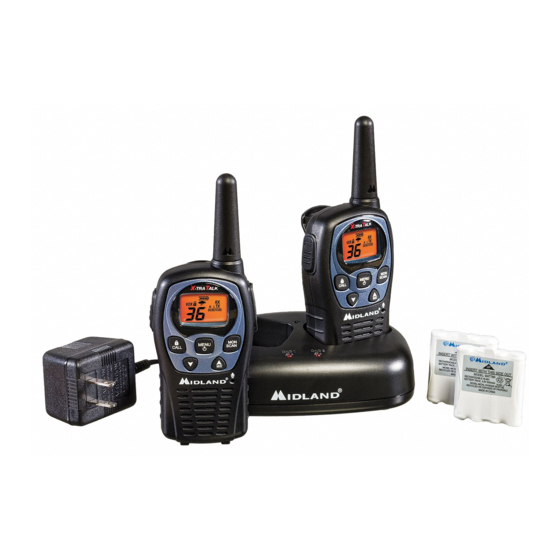Advertisement
Quick Links
LABORATORY TESTING PROCEDURES
TEST PREPARATION
1) Install 4 AAA Alkaline batteries (observe polarity markings).
2) Turn on unit by pressing the power button.
SYSTEM TEST
1) Radiated Transmit and Receive performance may be observed.
2) Audio out & Audio in are available at the Headset jack.
LABORATORY TEST - (UNIT UN-ASSEMBLED)
TEST PREPARATION
1) Disassemble unit (4 screws – 2 behind batteries). Remove the PCB from the cabinet.
2) Remove the antenna with soldering iron and install a 50 ohm coax cable in its place.
3) Either clip alligator leads or solder test leads to the power supply connections. The
negative terminal is the lower right PCB area. The positive terminal is the lower left
PCB area.
4) Connect 6VDC power source to the terminals, observing correct polarity.
5) Connect an 12-ohm load through the Headset jack
6) Connect a audio generator with 10uF coupling capacitor through the Headset jack
7) Select desired channel 1-36 using CH up/down keypad switch. The rubber keypad
may be removed from the front cabinet and used directly on the PCB.
LXT560
UNIT TEST - (UNIT ASSEMBLED)
Page 1
Advertisement

Summary of Contents for Midland LXT560
- Page 1 LABORATORY TESTING PROCEDURES LXT560 UNIT TEST - (UNIT ASSEMBLED) TEST PREPARATION 1) Install 4 AAA Alkaline batteries (observe polarity markings). 2) Turn on unit by pressing the power button. SYSTEM TEST 1) Radiated Transmit and Receive performance may be observed.
- Page 2 LABORATORY TESTING PROCEDURES LXT560 SPECIFIC TEST METHODS AND GUIDANCE Modulation Characteristics – (paragraph 2.1047(a) of the Rules) FOR TX AUDIO FILTER RESPONSE 1. Connect audio generator with 10uF coupling capacitor to microphone input jack. Press PTT button. 2. Connect RF output with modulation meter. (Filters of modulation meter should be set to a 25 Hz to 15 kHz.)











